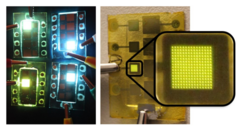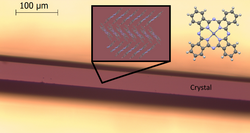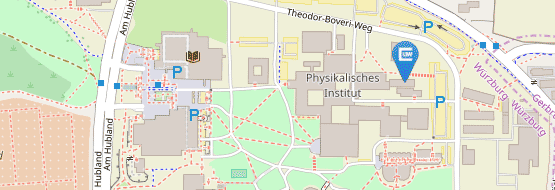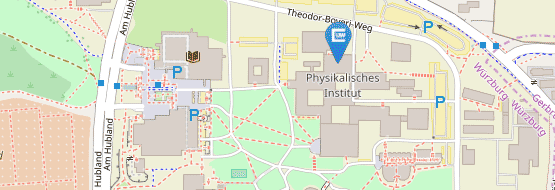Organic Electronics
“Organic Electronics” is a rapidly advancing field and, in recent years, has entered consumer applications by means of organic light-emitting diode (OLED) displays in mobile phones and home entertainment systems.
In this context, our research is concentrated on electronic excitations in molecular single crystals, crystalline thin films as well as single molecules and their interplay with the structural and electronic characteristics on nanometer length scale. Disclosing the fundamental processes together with their dependence on morphology and temperature allows for a fundamental understanding and, thus, improvement of the device performance of organic field-effect transistors (OFETs), organic photovoltaics (OPVs) as well as OLEDs. This knowledge also paves the way towards future, quantum-based functional units such as electrically driven molecular single photon sources or organic lasers both studied in our group.
The areas of interest of our scientific activities comprise the impact of the crystal structure on the emission properties under optical as well as electrical excitation, molecular sensors to probe the charge density distribution and local polarization fields at nanometer scales and, thereby, to carry-out non-invasive lifecycle analyses on OLEDs and OFETs under operation. Moreover, we aim for new molecules for advanced lighting in the NIR and IR and ultra-fast photo-switches based on low-dimensional organic metals.
Experimental infrastructure:
- Purification of molecular materials by gradient sublimation
- Crystal growth from vapor, melt, solution and electro-crystallization
- Ultra high vacuum physical vapor deposition for thin film and device preparation
- Structural characterization by X-Ray diffraction and atomic force microscopy
- µ-Photoluminescence together with lifetime analysis from 4 K to 400 K
- Confocal microscopy in combination with photon correlation measurements
If you are interested in a specific topic of our research or are looking for a master thesis feel free to contact Prof. Jens Pflaum for general questions or, for a specific topic, the responsible staff member:
- Molecular sensing and organic devices: Thomas Ferschke
- Low dimensional organic metals: Lisa Schraut-May
- Organic light emitting diodes and antennas: Björn Ewald
[1] Application of Fluorescent Molecules as Noninvasive Sensors for Optoelectronic Characterization on Nanometer Length Scales
Ferschke T, Hofmann A, Brütting W, and Pflaum J (2020). ACS Appl. Electron. Mater. [DOI]
[2] Phase transition induced spectral tuning of dual luminescent crystalline zinc-phthalocyanine thin films and OLEDs
Hammer S, Ferschke T, v. Eyb G and Pflaum J (2019). Appl. Phys. Lett. [DOI]
[3] Correlating nanoscale optical coherence length and microscale topography in organic materials by coherent two-dimensional micro-spectroscopy
Li D, Titov E, Roedel M, Kolb V, Goetz S, Mitric R, Pflaum J and Brixner T (2020). Nano Lett. [DOI]
[4] Ultrafast Pathways of the Photoinduced Insulator-Metal Transition in a Low-Dimensional Organic Conductor
Smit B, Hüwe F, Payne N, Okaoye O, Bauer I, Pflaum J, Schwoerer M and Schwoerer H (2019). Adv. Mater. [DOI]





